The AMD Ryzen Threadripper 3960X and 3970X Review: 24 and 32 Cores on 7nm
by Dr. Ian Cutress, Andrei Frumusanu & Gavin Bonshor on November 25, 2019 9:05 AM ESTCPU Performance: Web and Legacy Tests
While more the focus of low-end and small form factor systems, web-based benchmarks are notoriously difficult to standardize. Modern web browsers are frequently updated, with no recourse to disable those updates, and as such there is difficulty in keeping a common platform. The fast paced nature of browser development means that version numbers (and performance) can change from week to week. Despite this, web tests are often a good measure of user experience: a lot of what most office work is today revolves around web applications, particularly email and office apps, but also interfaces and development environments. Our web tests include some of the industry standard tests, as well as a few popular but older tests.
We have also included our legacy benchmarks in this section, representing a stack of older code for popular benchmarks.
All of our benchmark results can also be found in our benchmark engine, Bench.
Speedometer 2: JavaScript Frameworks
Our newest web test is Speedometer 2, which is a accrued test over a series of javascript frameworks to do three simple things: built a list, enable each item in the list, and remove the list. All the frameworks implement the same visual cues, but obviously apply them from different coding angles.
Our test goes through the list of frameworks, and produces a final score indicative of ‘rpm’, one of the benchmarks internal metrics. We report this final score.
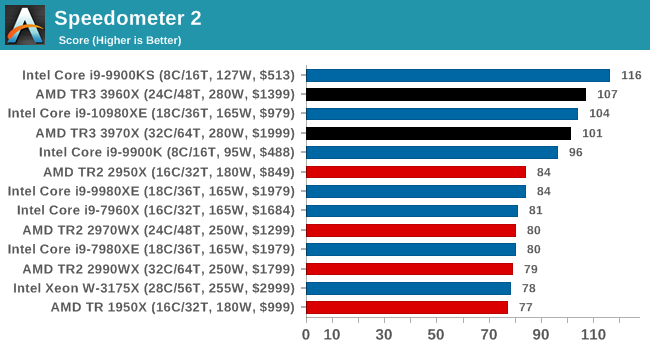
Google Octane 2.0: Core Web Compute
A popular web test for several years, but now no longer being updated, is Octane, developed by Google. Version 2.0 of the test performs the best part of two-dozen compute related tasks, such as regular expressions, cryptography, ray tracing, emulation, and Navier-Stokes physics calculations.
The test gives each sub-test a score and produces a geometric mean of the set as a final result. We run the full benchmark four times, and average the final results.
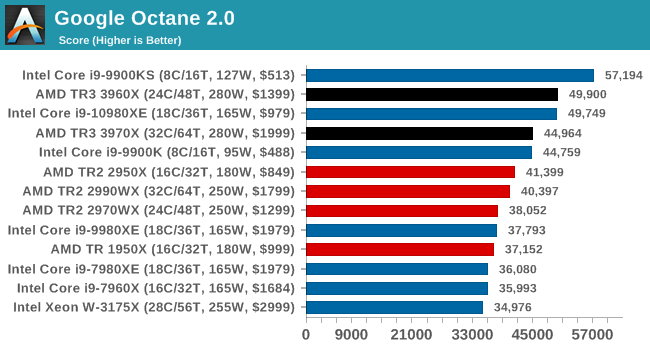
Mozilla Kraken 1.1: Core Web Compute
Even older than Octane is Kraken, this time developed by Mozilla. This is an older test that does similar computational mechanics, such as audio processing or image filtering. Kraken seems to produce a highly variable result depending on the browser version, as it is a test that is keenly optimized for.
The main benchmark runs through each of the sub-tests ten times and produces an average time to completion for each loop, given in milliseconds. We run the full benchmark four times and take an average of the time taken.
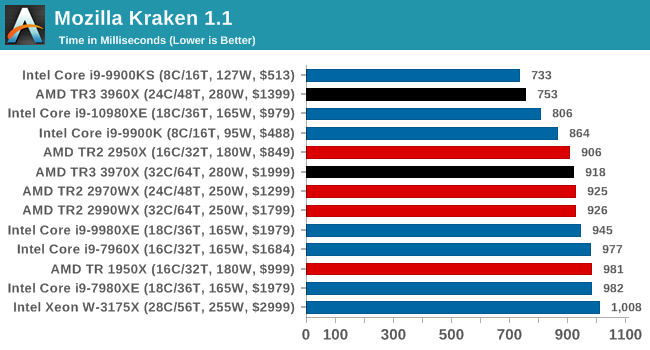
3DPM v1: Naïve Code Variant of 3DPM v2.1
The first legacy test in the suite is the first version of our 3DPM benchmark. This is the ultimate naïve version of the code, as if it was written by scientist with no knowledge of how computer hardware, compilers, or optimization works (which in fact, it was at the start). This represents a large body of scientific simulation out in the wild, where getting the answer is more important than it being fast (getting a result in 4 days is acceptable if it’s correct, rather than sending someone away for a year to learn to code and getting the result in 5 minutes).
In this version, the only real optimization was in the compiler flags (-O2, -fp:fast), compiling it in release mode, and enabling OpenMP in the main compute loops. The loops were not configured for function size, and one of the key slowdowns is false sharing in the cache. It also has long dependency chains based on the random number generation, which leads to relatively poor performance on specific compute microarchitectures.
3DPM v1 can be downloaded with our 3DPM v2 code here: 3DPMv2.1.rar (13.0 MB)
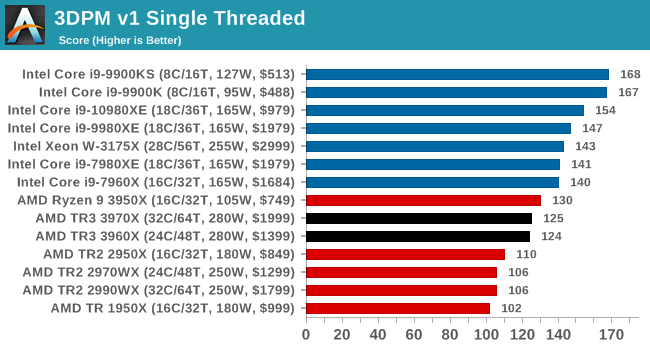
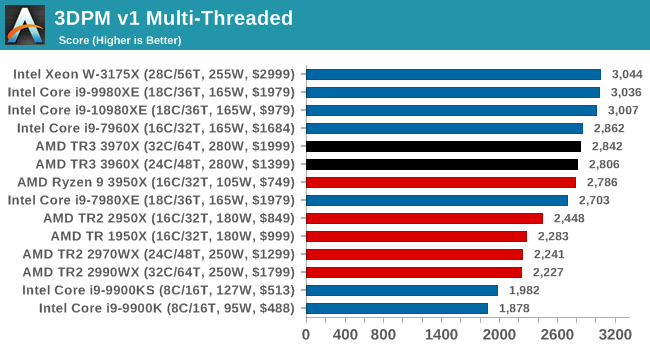
x264 HD 3.0: Older Transcode Test
This transcoding test is super old, and was used by Anand back in the day of Pentium 4 and Athlon II processors. Here a standardized 720p video is transcoded with a two-pass conversion, with the benchmark showing the frames-per-second of each pass. This benchmark is single-threaded, and between some micro-architectures we seem to actually hit an instructions-per-clock wall.
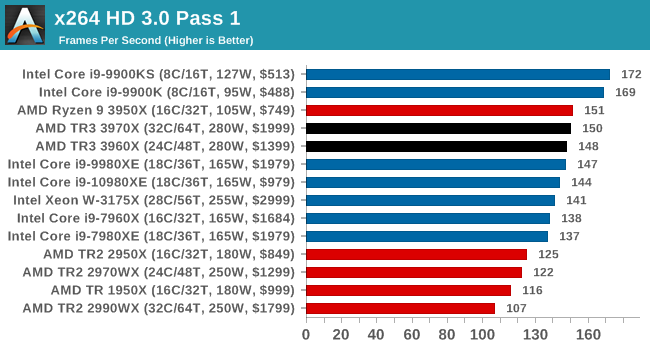
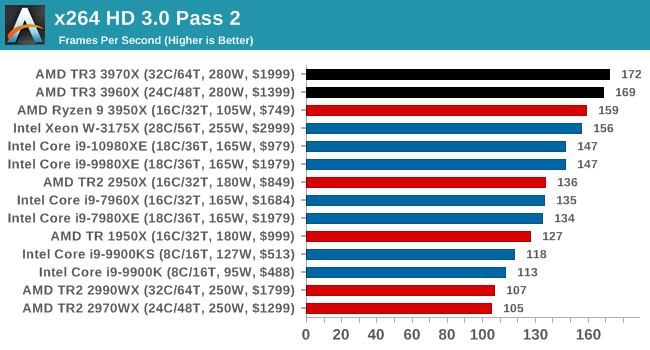
GeekBench4: Synthetics
A common tool for cross-platform testing between mobile, PC, and Mac, GeekBench 4 is an ultimate exercise in synthetic testing across a range of algorithms looking for peak throughput. Tests include encryption, compression, fast Fourier transform, memory operations, n-body physics, matrix operations, histogram manipulation, and HTML parsing.
I’m including this test due to popular demand, although the results do come across as overly synthetic, and a lot of users often put a lot of weight behind the test due to the fact that it is compiled across different platforms (although with different compilers).
We record the main subtest scores (Crypto, Integer, Floating Point, Memory) in our benchmark database, but for the review we post the overall single and multi-threaded results.
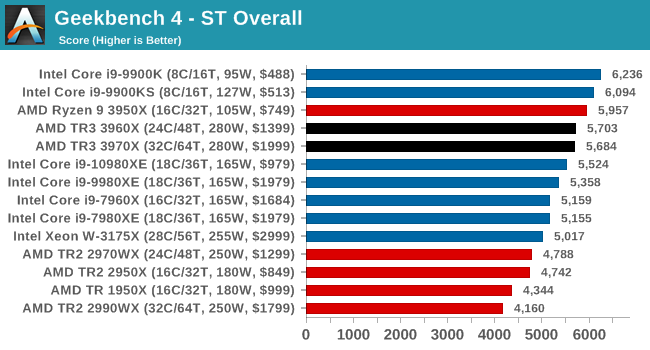
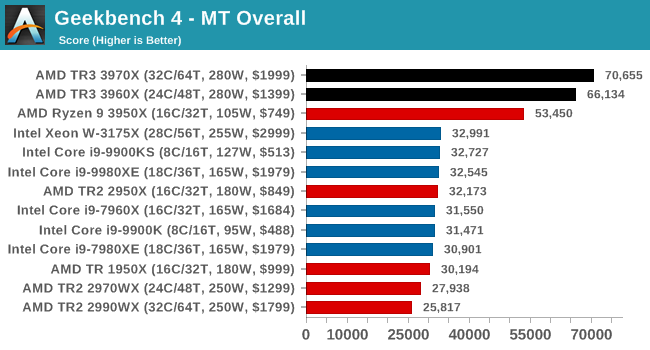










245 Comments
View All Comments
Dizoja86 - Thursday, November 28, 2019 - link
"Intel is going to have to have a shift its design strategy to compete."im.thatoneguy - Tuesday, December 3, 2019 - link
Any temperature stats? You recommend a good water cooler so it would be helpful to know how the thermaltake ring did under load.cdb000 - Sunday, January 26, 2020 - link
Seconded!In fact, a good write-up on how to cool a 280W CPU that is continuously running flat out.
My (old, slow) 1950X is cooled by a 280mm AIO and gets to ~61C when run flat out. These new Threadrippers use 55% more power which suggests that a 420mm or 480mm radiator will be required.
pvrvideoman - Thursday, December 5, 2019 - link
Great for AMD! Popular YouTube tech reviewers and others really need to stop saying that AMD has "crushed" Intel. That is just stupid. What they have done is deliver a very powerful, competitively priced product that delivers mostly the same or better performance at different price points. The desktop market is small. It's not making AMD or Intel all that much money. But it is great when companies like Amazon and Google talk about moving forward or transitioning to AMD Epyc line of processors. The enterprise and High Performance Computing contracts are where the real victory lies.tamalero - Tuesday, December 24, 2019 - link
holy intel apologist batman..alpha754293 - Monday, December 16, 2019 - link
When are the results from the benchmarking for the AMD Threadripper 3970X going to be on the benchmarking database?I tried looking for it just now and couldn't find it listed when I wanted to compare that and the AMD Ryzen 3950X.
Thanks.
lxxxxl - Thursday, December 19, 2019 - link
Is Chromium compilation still on the list of tests?And these new Threadrippers are not in Bench database?
soultorntech - Monday, December 23, 2019 - link
People concerned about the price between AMD and Intel HEDT processors need to calculate the per core cost and they will find out that the cost between the HEDT processors are pretty close. Add in the fact that Threadripper has a lot more L3 cache than the 10980XE plus can utilize up to 4 times as much RAM then the price of Threadripper 3 processors are a little easier to justify.stefanbatros - Sunday, December 29, 2019 - link
Hi everyone,I bought a 3970x + a Gigabyte Designare mobo. These will be used in a 4GPU setup for rendering and physics simulations.
Right now I have to chose between these 2 Ram kits, which are available and at a decent price in my country:
1. Corsair VENGEANCE® 128GB 3000MHz C16 -750$
2. G.Skill TridentZ 3000MHz C14 - 981$
Do you guys think that the C14 Gskill justifies the 200$ dollar difference? Will it be great improvement over the C16?
I am leaning toward the Vengence more because of price +is in stock in store + it is low profile and it will fit better with the Noctua nh-u14s tr4-sp3.
Any suggestions will ge appreciated.
Thanks,
Stefan
InfernusTitan - Friday, January 3, 2020 - link
A GTX 1080?Not Bottlenecking a 32 Core CPU in any ways??? I know core counts doesnt matter that much but still.